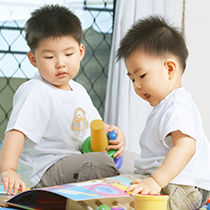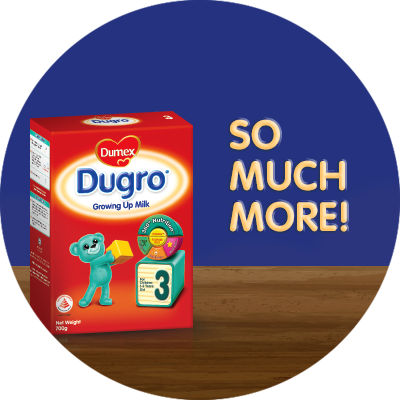Breastfeeding is the best for babies and a healthy diet / maternal nutrition is important when breastfeeding. A decision not to breastfeed can be difficult to reverse. Infant formula is suitable from birth when babies are not breastfed. It is recommended that all formula milks be used on the advice of a doctor, midwife, health visitor, public health nurse, dietitian, pharmacist, or other professional responsible for maternal and child care and the financial implications should be considered. All preparation and feeding instructions should be followed carefully as inappropriate preparation could lead to health hazards.
Importance of Music In Early Childhood Development
by Deborah Torres Patel
Much has been written about the study of music improving IQ, enhancing memory, and generally making a smarter child. There are multitudes of arguments about how specific or measurable the influence of music is on the brain, whether the ""Mozart Effect"" holds any weight, and how much music should or should not be included in a school's curriculum. However, nearly everyone who has ever spoken on the topic of music education agrees that music has the power to enhance learning.
Research indicates that musical children do better at reading, writing, math, language, and have a higher level of concentration and spatial reasoning than children not exposed to music have. Music can also provide a myriad of oral language benefits from grammar and pronunciation to quickly picking up rhythm and accents in first or second language study. It can build social and emotional skills, decrease performance anxiety, assist motor development, and boost creativity. Additionally, solo music performance has been known to increase self-capacity and self-esteem.
Most experts agree that the best time for developing musical aptitude is between birth and nine years old. It is generally agreed upon that studying music before the age of seven can have a long-term effect on a child's overall development.
All children have musical ability. When music is playing, it can easily capture a young child's attention especially if it is related to an activity that involves other family members. Parent's can take an active role in fostering the musical growth of their kids by exposing them to a variety of musical skills. Even if parents are non-musical they can still make a difference by making music a part of the family's daily life.
Musical intelligence can be divided into five categories.
Vocal skills - The ability to sing in tune, in harmony, and with a confident voice can be developed with frequent and consistent practice.
Tips ages 1-3
- Sing with or to your children
- Play games that involve music and movement and act out the words to songs like ""Twinkle, Twinkle Little Star"", ""Itsy Bitsy Spider"", and ""I'm a Little Teapot"".
- Teach kids how to clap their hands and stomp their feet in time to the music by starting with a slower and steady beat. As they catch on, you can play faster music and eventually guide them through a variety of musical beats, tempos, and styles.
- In a swimming pool or bath do call and response splashing. For example, one person hits their hands against the water to make a certain number of splashes and the other responds with the same number of splashes and in the same rhythm. It is fun to play with a variety of speeds and tempos. Children adore getting their parents, and siblings all wet.
- Compose percussion sounds with the body. Keep the beat by clapping hands, stomping feet, snapping fingers or clicking tongues.
- Encourage kids to sing to their heart's content. Have them sing about what they like and help them to make a 4-line song that rhymes. (For example, I like sweet potatoes, I like peas, I like chocolates, May I have some please? Keep the ""I like"" part consistent and play around with the underlined areas.) Playing toy instruments are an excellent introduction to real musical instruments. Encourage kids to make their own instruments. Simple kitchen items are great for this. (For example, put rice or beans in an empty plastic container and you have maracas or shakers. Wooden spoons on pots and pans or boxes make great drums.)
- From the age of 3 years old, a child's brain circuits are mature enough to begin music lessons. The piano is usually the best instrument to start with because it does not require any specific fingering to play. Listen to music from a variety of styles, cultures, and time periods. Go to the zoo or park and try to identify animals or birds by their song or sounds Sing songs throughout the day to help children transition or remember a sequence of daily activities. (For example, mealtimes, playtimes, before going out, while traveling, bathtime, bedtime etc.) Sing songs leaving out a word and have your child fill in the blank. For example, you could sing ""Mary had a little ____"" little ____, little ____ and have your child sing ""lamb"".
Tips ages 3-6
- Action songs like ""The Hokey Pokey""and ""If You're Happy and You Know It"" are great to engage kids whole bodies. Have your little ones make up their own actions to any song. Sign or act out the entire alphabet while singing the ABC's.
- Sing Karaoke (This is especially helpful for children learning to read.)
Rhythmic skills - The pattern of long and short note values in music. Learning rhythmically is easy for most people. Rhythm and rhyme are found in poetry, children's songs and in the ever-popular nursery rhyme.
- Language can be musical - Read poetry, books and/or nursery rhymes aloud daily
- Exercise to music and encourage children to make up their own movements and dances. Expose them to many different types of music using ballroom dance rhythms, classical instrumentals, popular and ethnic music, etc. March, skip, run, jump, wiggle or shake in time to the music - Anything goes.
Composing skills - The ability to write songs, melodies or make up rhymes.
- Write poetry together
- Make up raps, rhymes or jingles with a list of things you'd like to remember. (For example, a shopping list, or items to pack in a school lunch or school bag.)
Instrumental skills - The ability to play a musical instrument.
- Encourage your child to play a musical instrument. However, it is important not to push your child to do so.
- Have your kids choose the instruments that they would like to play by picking the sound they like best. (For example, a violin sound, a flute sound, a piano sound, etc) They will practice more if they like hearing the sound that the instrument makes.
Listening skills - Most people like listening to music. It is important to expose your child to many different types of music to develop well-rounded appreciation. It is very beneficial to allow your children to listen to music they like as this encourages their self-expression and often assists older children to release emotions that they may not readily or openly share.
- Invest one hour a week listening to music that is unfamiliar to you and expands your horizons (This can be done easily tuning into different radio stations
- Attend concerts and musical theatre
Musical Memory Skills
Most of us can dance to a beat or remember a jingle, poem, or rhyme. By the simple act of repetitive listening, we often know words to songs even though we made no conscious effort to memorize them.
Repetition is the simplest and fastest way to teach your child. Practice, practice and more practice guarantees consistent results over time.
© Copyright 2004 Deborah Torres Patel. May not be reprinted without permission.
Email Deborah@ExpressingYOU.com


Ask Our Careline
Whatever’s on your mind, we’re here to help




